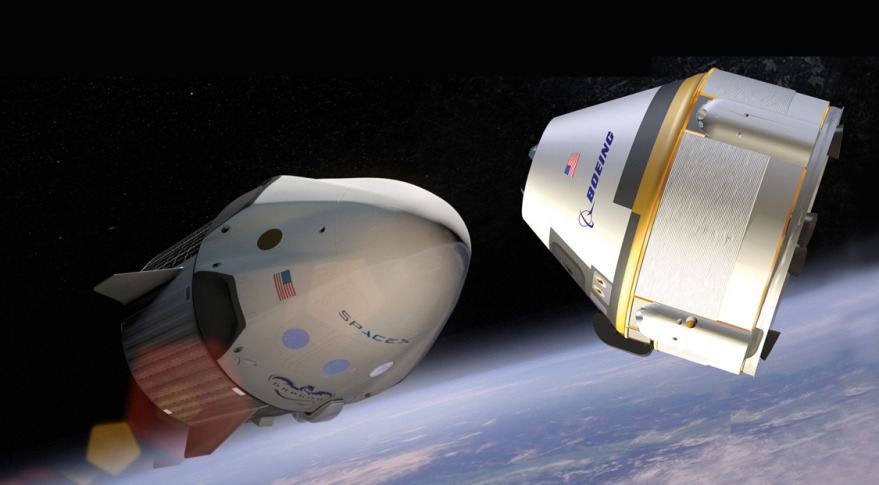Commercial Crew Delays Threaten Access to ISS, GAO Warns

CINCINNATI — Amid growing concerns about commercial crew delays, a U.S. Government Accountability Office report recommended NASA share more schedule information with Congress and develop contingency plans to maintain access to the International Space Station.
In a July 11 report, the GAO said that Boeing and SpaceX could miss their current schedules for having their commercial crew vehicles certified by NASA by a year or more, creating a gap in access to the station when the agency's use of Soyuz seats ends late next year.
"Boeing and SpaceX continue to make progress developing a capability to fly to the ISS, but both have continued to experience delays," the GAO concluded in its report. "Additional delays could also disrupt U.S. access to the ISS." [Boeing CST-100 Starliner: Next-Generation Spaceship]
Current public schedules call for Boeing and SpaceX to make uncrewed test flights in August, followed by crewed test flights by Boeing in November and SpaceX in December. On that schedule, Boeing would be certified by NASA to transport astronauts to the ISS in January 2019, followed by SpaceX in February.
However, those dates are expected to slip, perhaps significantly, according to NASA's own schedule risk analysis assessments. "In April 2018, the program's schedule risk analysis found there was zero percent chance that either contractor would achieve its current proposed certification milestone," the report stated.
Instead, that analysis predicts the "average" certification date to be December 2019 for Boeing and January 2020 for SpaceX. That's nearly the reverse of what the GAO reported earlier this year, when it said NASA was projecting an average certification date of December 2019 for SpaceX and February 2020 for Boeing. [Step Inside Crew Dragon: SpaceX Reveals Interior of Crewed Space Capsule]
The report notes, though, that those dates could slip further: NASA's range of dates for the certification milestone extend into the fall of 2020. That becomes a concern for NASA since the agency's access to Soyuz seats for transporting astronauts to and from the station ends in late 2019.
Get the Space.com Newsletter
Breaking space news, the latest updates on rocket launches, skywatching events and more!
The GAO said that NASA needs to develop a contingency plan for continued ISS access should commercial crew certification slip to 2020. "If NASA does not develop options for ensuring access to the ISS in the event of further Commercial Crew delays, it will not be able to ensure that the U.S. policy goal and objective for the ISS will be met," the report argued.
NASA has offered some approaches to addressing a potential gap, including stretching out the schedule of Soyuz flights to the ISS to extend access to the station until January 2020. NASA also said earlier this year it was considering extending the crewed demonstration flights, allowing them to stay at the station for up to several months to maintain a U.S. presence there.
Other unidentified options are apparently under consideration as well. "However, officials told us that planning for contingencies is difficult given the extensive international negotiations required for some options," the report noted.
The GAO also chastised NASA for not incorporating updated schedule information and passing that information along. Agency officials last month continued to stick to the schedule announced earlier this year despite widespread expectations that those dates will slip, saying only that revised schedules will be announced soon.
"We found that both contractors have updated schedules that indicate delays are forthcoming for at least one key event, but NASA officials told us they lack confidence in those dates until they are officially communicated to NASA by the contractors," the report stated. "As a result, NASA is managing a multibillion dollar program without confidence in its schedule information as it approaches several big events, including uncrewed and crewed flight tests."
GAO also recommended that NASA include its own schedule risk analysis in its quarterly reports to Congress. NASA, though, said in a response that it has no plans to do so, and will instead maintain current practice of using company estimates along with a "qualitative statement" from the agency on those schedules.
"There will not be a requirement for detailed NASA risk assessment," the agency said in a response signed by three officials, including Bill Gerstenmaier, associate administrator for human exploration and operations. "The partners schedule risk assessment will match NASA's analysis or NASA will discuss our position as we have in past reports."
The GAO argued its recommendation was still worth accepting. "We continue to believe the recommendation is valid because the program's schedule risk analysis would provide Congress with valuable insight into potential delays, which are likely," it stated in the report. "Without this information, Congress does not know the full extent of potential delays to inform decision making."
NASA accepted other recommendations in the report, including development of a contingency plan for ISS access if there are further crew delays. That plan will be complete by the end of December, the agency said in its response.
Other recommendations addressed safety issues, including separating the roles of managing commercial crew safety issues and independent oversight of safety so that the same person doesn't hold both. It also agreed to document lessons learned from the use of the "loss of crew" metric for crew safety.
NASA partially agreed to a final recommendation about documenting its risk tolerance level regarding crew safety, arguing that it did so years ago even if the existence of other documents on risk requirements "can be confusing."
This story was provided by SpaceNews, dedicated to covering all aspects of the space industry.
Join our Space Forums to keep talking space on the latest missions, night sky and more! And if you have a news tip, correction or comment, let us know at: community@space.com.

Jeff Foust is a Senior Staff Writer at SpaceNews, a space industry news magazine and website, where he writes about space policy, commercial spaceflight and other aerospace industry topics. Jeff has a Ph.D. in planetary sciences from the Massachusetts Institute of Technology and earned a bachelor's degree in geophysics and planetary science from the California Institute of Technology. You can see Jeff's latest projects by following him on Twitter.

